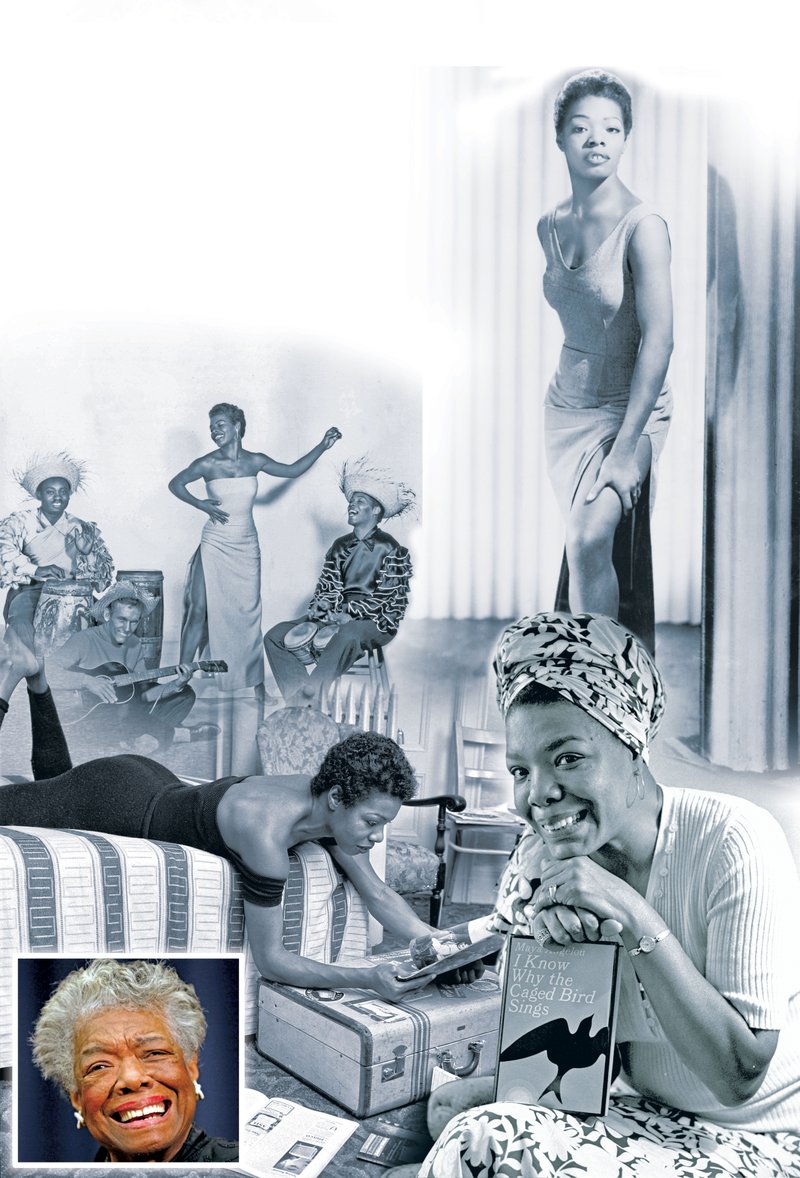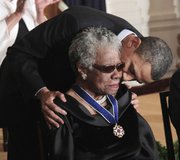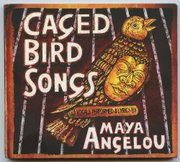Maya Angelou, the most famous former resident of the Lafayette County town of Stamps, overcame a troubled childhood and forged a career that culminated in her delivery of her poem, "On the Pulse of Morning," at the first inauguration of another famous Arkansan -- President Bill Clinton.
But who would expect that the last project of the legendary poet -- and author, dancer, actress and singer -- would cast her in the role of ... rap star?
That isn't so far-fetched, as modern-day rap has its early influences in the spoken-word poetry of Gil Scott-Heron and The Last Poets.
Angelou, who died May 28, lives on via her album Caged Bird Songs (Smooch Music), which consists of 13 of her poems set to music. It has been labeled hip-hop by some, but it brings in a plethora of genres to deliver messages of joy, pain, unity, rebuke, defiance and just plain humor.
The seven-years-in-the-making project was co-produced by Shawn Rivera, who himself has seen some of the same pain, and triumph, experienced by his muse.
A LIFE TRANSFORMED
Rivera, formerly of the R&B group Az Yet, was inspired to do the project after Angelou "saved my life without even knowing it."
"I had come across some of Maya's work when I was in a bad place ... I was kind of questioning where my life was going and feeling really disenfranchised by the music industry, purposeless and ... contemplating taking my life," Rivera says. He came across a copy of Angelou's 1969 autobiography, I Know Why the Caged Bird Sings, in a storage room at a movie studio where he was working. At first, he read it to pass the time. But as he went through her story, he found a lot of things they had in common. At an early age, Angelou experienced the divorce of her parents, along with racial discrimination and poverty while living in Stamps; rape at age 7 at the hands of her mother's boyfriend while back with her mother in the city of Angelou's birth, St. Louis; and single motherhood at 16.
"It really hit my heart," Rivera says. He concluded that she had overcome more than he felt he had a right to complain about. "My life was just beginning ... it was my 'Aha' moment," Rivera says.
"I was inspired out of gratitude" to start the album project, Rivera says. It was a way, he said, to "use my art to thank her for hers."
Rivera, operating officer for Smooch, is a friend of screenwriter/vocal arranger Troy Hinton, son of Smooch Music co-founder Van Jewell. Hinton urged Rivera to talk to his mother and her husband, Smooch co-founder Laurence Kantor, about the project.
They were impressed, Jewell says, describing the album as "a very, very special project."
Getting the project to Angelou's attention was a circuitous, challenging journey.
"We were allowed to work on the project within the legal structure with limitations, but we could do nothing with it unless she and her publishing company and attorneys all approved it," Jewell says. "We went as far as we could go legally on our own. It was a long but worthwhile process."
In April 2008, Rivera met Angelou when he attended -- crashed, actually -- her 80th birthday celebration and persuaded her to listen to a small portion of the project.
"She listened and pretty much fell off her chair," says Jewell, a former member of The 5th Dimension.
Rivera and Jewell continued working on the recording and "trying to get through to her attorneys and business associates to get her approval," Jewell says. "Finally, it was approved by her to work with us to complete the project." That approval came in January 2013.
APPROVAL, PARTICIPATION
"We were lucky to have not only gotten her approval, but her participation," Rivera says.
Jewell and Rivera worked with Angelou at her home in Winston Salem, N.C., for three days in April 2013 and for three days in October 2013.
"I was really nervous to meet her," says Jewell, who felt a bit intimidated. But a friendship was forged. Angelou invited them to return for her Thanksgiving weekend and they become a part of Maya's Village, her extended family.
"She was a real person; she didn't play games. She was really funny," Jewell says. "She made people feel like they really matter. ... She was a woman of substance, if I can say it mildly.''
Angelou "really knew music," Jewell says. "She knew what she wanted, and knew what she didn't want."
Jewell and Rivera felt "fresh beats" were needed and brought in musician RoccStar, whose production credits include Jennifer Lopez, Jennifer Hudson and CeeLo Green.
"There were a couple of times when Dr. Angelou was like, 'This needs to be faster'" or telling them to take something out or put something in. "If she felt strongly about something, she'd let you know."
Toward the end of April, Angelou was sent a copy of the nearly finished album. By the second week of May, Jewell was concerned because they hadn't heard back.
"We knew she was in and out of the hospital. ... I decided that we should call her directly ... so Shawn [Rivera] and I got on the phone."
They asked Angelou what she thought. "'Yes, I listened to some of the tracks and I like it very much,'" Jewell recalls her saying.
Jewell felt it needed to be tweaked in a few places: Angelou's voice volume increased and more percussion added to "Harlem Hopscotch" to make a dance out it, like the Macarena.
Angelou liked the idea, Jewell says.
"She then said, 'Well, I think you are being guided.' She ... gave us her blessings and we both put it in God's hands. Two days later, she signed off on the project."
Two weeks later, on Jewell's birthday, Angelou passed away.
THE SONGS
The poems chosen for Caged Bird Songs reflect the chronological journey of Angelou's musical roots and work, starting with her 1950s-era Miss Calypso era, Rivera says. (Angelou made a recording of calypso songs in 1957 titled Miss Calypso.)
"Some of the works were designed to showcase her evolution," Rivera says, starting with the 1950s, then the black-activism era of the 1960s and '70s.
"She was really more outspoken" in this era, Rivera says, citing the selections "The Thirteens" and "Sepia Fashion Show" as examples of her grittier work.
Although it's labeled a hip-hop album, the 13 cuts that made Caged Bird Songs transcend any single genre. The musical eclecticism is intentional, Rivera says, adding that one of the musicians, guitarist Gemi Taylor, played with such groups as Larry Graham and Graham Central Station, Sly and the Family Stone and others.
Take the first cut, "Human Family." For this short, brisk poem, which bears the message that "we are more alike, my friends, than we are unalike," the music has elements of funk. Or the very rhythmic "Pow Pow," which utilizes a jazzy, guitar-enriched sound set to a rolling snare drum as background for what is essentially an unofficial shoeshine man's anthem. Bongos and bass guitar make up the funky track for "Harlem Hopscotch," Angelou's poem about the hard times for the poor in Harlem.
And there's the folksy, ultra-catchy "Pickin' 'Em Up," "about a Lothario who runs when women try to form relationships with him. It emphasizes the upbeat, with clapping helping the percussion on the downbeat," Rivera says.
"On Aging," the ode to getting older, features a funk music background reminiscent of Stevie Wonder's "Superstition," with a funky electric guitar solo. Smooth jazz is evident on the sexy "Come and Be My Baby," while a perky funk background frames "The Thirteens," a poem dealing with some tough issues.
"Still I Rise," the final track and one of Angelou's most well-known poems, is a gospel number, with singers.
"I think if you listen to the album with a broad ear" the influences of those genres become evident, Rivera says. But "a lot of people, when they heard the spoken word over a beat, they think hip-hop."
Angelou "wanted to reach out to the younger generation and it was really important to her," he says.
PASSING THE TORCH
Indeed, says Chris James of North Little Rock, Caged Bird Songs is "something that young people would gravitate towards." James, founder of Poetry Saves Lives, teaches spoken-word poetry and creative writing at Robinson Elementary School in Little Rock.
"I can see it definitely being something that pushes Maya's words and sounds to another level to make it reach out to young people," says James, who also goes into classrooms to integrate the arts into other subjects such as algebra through his "Everybody Loves Hip-Hop" workshop.
"I do agree with the project in that manner. I do think it [can] be successful."
Rivera, who describes Angelou as "very prophetic," figures that this time next year other rappers and producers will be remixing and covering the cuts.
There are more where those came from, Jewell says, "probably another 30 or 40 pieces of music." Some will be released on the album's deluxe edition. "She sang a lot of songs; she remembered growing up along with [the traditional spiritual] 'Pilgrim of Sorrows' and [she also recited] many poems, [all] hopefully to be used in the future," Jewell says.
"I hope [young people] do confuse this record as a hip-hop record" and are thereby positively influenced by Angelou's work, Rivera says.
Jewell sees that happening, too.
"She's very much with us still," she says of Angelou. "She's still running the show."
Style on 12/14/2014




